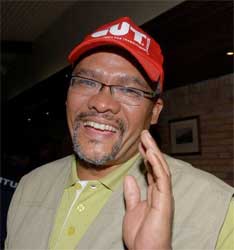A new labour strike is looming at a time when South Africa can least afford it. As many as 200,000 workers in the metal and engineering sector could down tools as wage talks deadlock.

Deputy General Secretary of Numsa, Karl Cloete says that a strike is inevitable if employers don't meet demands for a 15% wage hike for industrial workers. Image:
Union BookThe National Union of Metalworkers of South Africa confirmed that, although it was still in talks with three employers' organisations - representing about 12500 employers - a national strike is set for 4 July.
There is concern that the economy cannot take another strike in light of the crippling industrial action in the platinum sector, which, having begun in January, is now the longest strike in South African mining history.
While the rest of the world is recovering from recession, South Africa is drowning.
Karl Cloete, Deputy General Secretary of Numsa, said 174,000 of the 200,000 union members in the metal and engineering sector belong to the union.
They are demanding a 15% increase but employers are offering 6.1%. Last week, unions including Numsa and the United Association of SA declared a dispute.
"We are going into further talks with the employers. Through general meetings we are communicating with members to receive the necessary mandate. But the membership made it clear that, [given] where the employers are coming from, they can see nothing else but to force the employers through strike action, to concede," said Cloete.
"Not our first choice"
"That is never our first choice but the employers have just been very, very arrogant. They are not making a case of financial hardship or the inability to pay. And you can't jump opportunistically on some analysis that says unless the platinum strike is resolved, the country is likely to go into a recession, and therefore blackmail workers who have legitimate demands," he said.

David Shapiro of Sasfin says a strike in the industrial sector would be devastating for South Africa's economy. Image:
Adele Searll 100 ClubEconomists believe it is time to panic. Stats SA announced last week that real gross domestic product declined in the first quarter of the year - by 0.6% quarter on quarter, annualised and at market prices - for the first time in five years. The trade deficit has expanded to more than R13bn.
David Shapiro, Deputy Chairman of Sasfin Securities, said: "At a time when the rest of the world is coming out of recession and trying to grow and grind its way up, we are going the other way. Regardless of whether the metalworkers go on strike, we should be panicking."
Chris Hart, economist at Investment Solutions, warned that investors did not want to expose themselves to local labour because of disputes.
"When I look at the violence associated with these strikes, I would love to know what the difference between these unions and a mafia protection racket is," he said.
"To create jobs, employers were needed and employers, in turn, needed investment," he said.
But Johan van Niekerk, Divisional Manager at Uasa, said: "As a responsible trade union we will not just go out and strike to prove a point. We will obtain a mandate and we will of course take into consideration the current economic situation in the country as well as the members' needs."
Companies that would be affected by a metalworkers' strike include international appliance manufacturer Defy, DCD, an international manufacturing and engineering company that supplies the rail, defence, mining and energy sectors, and Macsteel.
The Chief Executive of the SA Chamber of Commerce and Industry, Neren Rau, said the trouble in the platinum, sugar and now the metal sectors was of concern because these industries were key to export generation.
"Is South Africa to be seen as an unreliable trade partner? That is a reputation we can't afford," he said.
source: The Times via I-Net Bridge



















































